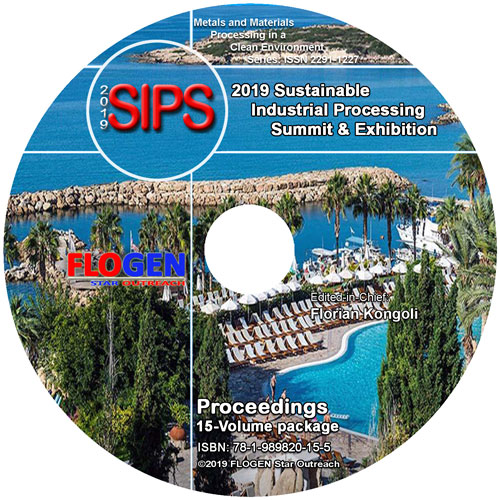2019-Sustainable Industrial Processing Summit
SIPS2019 Volume 3: Kobe Intl. Symp. / Science of Innovative and Sustainable Alloys and Magnets (SISAM)
| Editors: | F. Kongoli, M. Calin, J.M. Dubois, K. Zuzek-Rozman |
| Publisher: | Flogen Star OUTREACH |
| Publication Year: | 2019 |
| Pages: | 156 pages |
| ISBN: | 978-1-989820-02-5 |
| ISSN: | 2291-1227 (Metals and Materials Processing in a Clean Environment Series) |

CD shopping page
Bulk metallic glasses studied by fast calorimetry combined with time resolved X-ray diffraction
Florian Spieckermann1; Innozeznz Steffny2; Xilei Bian2; Sergey Ketov2; Mihai Stoica3; Martin Rosenthal4; Juergen Eckert5;1UNIVERSITY OF LEOBEN, Leoben, Austria; 2ERICH SCHMID INSTITUTE, AUSTRIAN ACADEMY OF SCIENCES, Leoben, Austria; 3ETH ZUERICH, Zuerich, Switzerland; 4ESRF, Grenoble, France; 5ERICH SCHMID INSTITUTE OF MATERIALS SCIENCE, Leoben, Austria;
Type of Paper: Regular
Id Paper: 103
Topic: 42
Abstract:
Novel processing technologies for metals such as 3D printing require the application of high heating and cooling rates and ideally the use of isotropic materials. The glass-forming alloys are good candidates for such applications. We directly determine the thermodynamic fragility index of two metallic glasses (Mg65Cu25Gd10 and Au49Cu26.9Si16.3Ag5.5Pd2.3) from fictive temperature shifts induced by a variation of the quenching rate using fast differential scanning calorimetry (FDSC). Recent chip calorimeters are able to achieve the cooling rates necessary to perform such an evaluation. For the Mg65Cu25Gd10 and Au49Cu26.9Si16.3Ag5.5Pd2.3 metallic glasses studied, we find very good agreement of the kinetic fragility index with literature data obtained by conventional calorimetry and rheology. We also applied ultra-fast chip calorimetry in combination with time-resolved micro-diffraction directly recorded with fast pixel array detectors. This way we can investigate the structural modifications of bulk metallic glasses (BMGs), in-situ, on ultra-fast temperature changes. Combining the very high time resolution of structural and calorimetric data acquisition, we investigated the mechanisms and the kinetics of the metastable phase transformations of this group of materials at ultra-high rates of temperature change. The understanding of the kinetic transition paths of- to date still unknown- metastable material states is the foundation for the development of tailored thermomechanical treatment routes towards novel applications of BMGs.
Keywords:
Amorphous Materials;References:
Spieckermann, F.; Steffny, I.; Bian, X.; Ketov, S.; Stoica, M. & Eckert, J.Fast and direct determination of fragility in metallic glasses using chip calorimetry
Heliyon, 5 , e01334